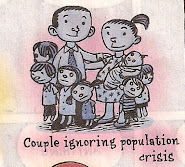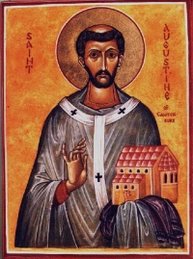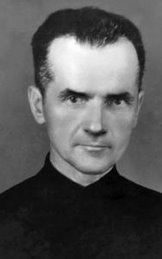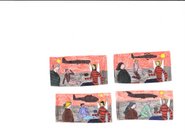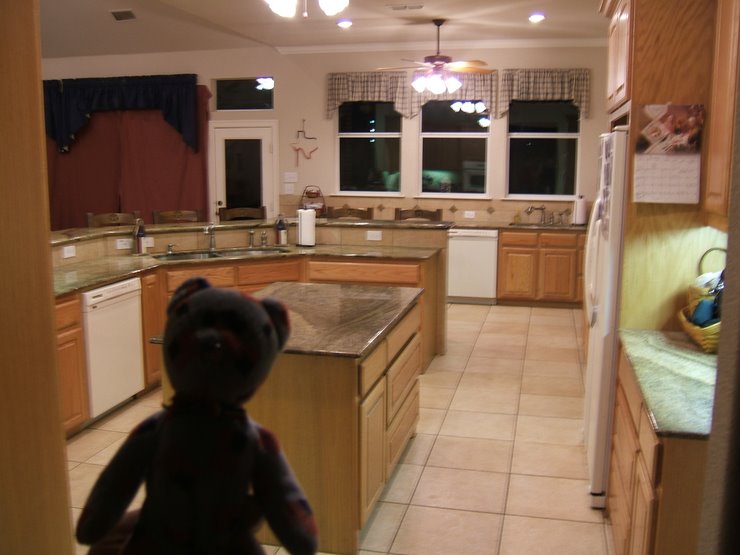There are a couple of new book reviews up at Praise Of This Book.
Here is the link for the good review, which is a series of essays on the sources for J.R.R. Tolkien's works. It is called Tolkien and the Study of His Sources. I was impressed with the essays, especially after discovering that one of them was written by a professor at Texas A & M/Commerce.
What a small world.
Theodore's Memorial Video
Tuesday, January 31, 2012
Sunday, January 29, 2012
Remembering Fr. Downey
Four years ago on this day, Fr. James Downey, OSB died. He was a Monk of St. Benedict's Abbey in Atchinson, Kansas. Part of his work was in the Pro-Life movement.
I knew him while I was in residency and fellowship. He referred to me as his private physician - probably the only person in the world who will ever consider me as that.
The anniversary of his death comes close on the heels of the HHS rule which will make contraceptives mandatory for all health insurance carriers. The U.S. Catholic bishops have properly voiced their opposition to this law which would make all those compliant to be guilty of mortal sin. It is ironic, though, that for so many years most priests and bishops have either opposed the Church's teaching on contraception and abortion or have remained silent on the subject, and now they expect the Faithful to join them in their fight against this ruling. Unfortunately, most poorly formed Catholics see no problem with contraception. Here is a video which explains it better than I ever could:
Thankfully, Fr. Downey was on the side of Life, and the Magesterium.
Eternal rest grant unto him, and may perpetual light shine upon him. May his soul, and all the souls of the Faithful Departed, through the Mercy of God, rest in peace.
I knew him while I was in residency and fellowship. He referred to me as his private physician - probably the only person in the world who will ever consider me as that.
The anniversary of his death comes close on the heels of the HHS rule which will make contraceptives mandatory for all health insurance carriers. The U.S. Catholic bishops have properly voiced their opposition to this law which would make all those compliant to be guilty of mortal sin. It is ironic, though, that for so many years most priests and bishops have either opposed the Church's teaching on contraception and abortion or have remained silent on the subject, and now they expect the Faithful to join them in their fight against this ruling. Unfortunately, most poorly formed Catholics see no problem with contraception. Here is a video which explains it better than I ever could:
Thankfully, Fr. Downey was on the side of Life, and the Magesterium.
Eternal rest grant unto him, and may perpetual light shine upon him. May his soul, and all the souls of the Faithful Departed, through the Mercy of God, rest in peace.
Saturday, January 28, 2012
Book Review: Lifting the Wheel of Karma
Lifting the Wheel of Karma: A Profound Spiritual Journey of Extraordinary Healing and Redemption, by Paul H. Magid
Point Dume Press, 2012
"Ergo silebo." - J.R.R. Tolkien
"I think we must get it firmly fixed in our minds that the very occasions on which we should most like to write a slashing review are precisely those on which we had much better hold our tongues."
- C.S. Lewis
I seem to always be in the minority. I did not care for this book, and would not recommend it. I looked in vain for anyone who shared my opinion. When I keep finding objectionable things as I read a book, I finally get to the point where I have to reject the whole thing. And now, meditating on the words of Tolkien and Lewis up above, I shall make this review as constructive as possible.
I should start by saying that I do not reject this book because it presents Eastern religion or mysticism. I actually enjoyed the part of the book which discussed the various aspects of the Indian religions. As a reader, knowing this to be fiction, there were certain things which happened in this book (spoilers) which I took as plausible because they were consistent with the eastern mysticism presented in this book. In short, I went ahead and, for argument's sake, assumed some things to be true which I know to be not true. I would be more specific, but I would have to mention a spoiler.
I'll start with the things I did liked about the book. I think Mr. Magid described the settings very well, especially those of the scenes in India. I especially thought that he did a good job describing Lahiri's village and environs. Perhaps it's just reminded me of the time I spent in the mountains of Switzerland when I was a little boy. Either way, I felt as if I were in India, in the mountains.
Now onto the negatives........
Joseph's brother Bill accompanies him all the way to the other side of the world, traveling by airplane, rail, taxi, and finally even by ox-cart to reach their final destination in the Himalayas. Then, once Joseph meets up with Lahiri, Bill turns around and leaves. Just like that. He doesn't rest overnight before starting on the long journey home. He doesn't eat. Heck, he doesn't even go to the bathroom before leaving his brother. What about his return ticket? Did he know how long it would take to escort his brother to the mountains? These are the kind of inconsistencies which bother me about books. I finished the book still fretting over Bill leaving so abruptly.
Then there is the question of the wheelchair. Unless I misunderstood, the main character needs a wheelchair to get around. Not only does he need a wheelchair, but I think he also had use of only one hand, which would make an electric wheelchair an absolute necessity. I have a little experience with wheelchairs, from assisting my brother with his wheelchair, to transporting patients throughout a hospital while I was a college student, to spending an arduous day in one as part of our training in medical school. So it seemed a bit farfetched to have a character who relies on an electric wheelchair go off to a village so remote that he had to reach it riding in an ox cart. Every rock, carpeting, any slight pitch or camber in the sidewalk - not to mention curbs - were like insurmountable obstructions to my patients and I as we traveled along; just imagine that same wheelchair in a village without any 'advanced' amenities.
Don't get me started on things which were snuck through airport security......
Finally, there is the question of what constitutes a novel. Reading this book, I suddenly realized that I was halfway through it when I reached page ninety-five. Around the same time, I noticed the phrase 'A Novel' on the front cover. While the definition of a novel does not stipulate a certain number of pages to qualify, it does suggest that a novel should encompass a span of time completely, not sketchily. This book covers about fifty-five years in less than two hundred pages, leaving a lot of questions as to what happened in the gaps in the story. I figure that there could have been a lot of friendships made and broken, loves found and lost, and mayhem created which the author could have included in his book. This was the ultimate disappointment.
I suspect that most readers will disagree with me, but thats how it goes sometimes. I welcome you to read this book and make your own judgement on the merits of this book.
Details:
Paul H. Magid web site:
http://www.paulhmagid.com/
Paul H. Magid Facebook:
https://www.facebook.com/
Lifting the Wheel of Karma Facebook:
https://www.facebook.com/
Tribute Books Blog Tours Facebook:
https://www.facebook.com/
Lifting the Wheel of Karma blog tour site:
http://liftingthewheelofkarma.
Point Dume Press, 2012
"Ergo silebo." - J.R.R. Tolkien
"I think we must get it firmly fixed in our minds that the very occasions on which we should most like to write a slashing review are precisely those on which we had much better hold our tongues."
- C.S. Lewis
I seem to always be in the minority. I did not care for this book, and would not recommend it. I looked in vain for anyone who shared my opinion. When I keep finding objectionable things as I read a book, I finally get to the point where I have to reject the whole thing. And now, meditating on the words of Tolkien and Lewis up above, I shall make this review as constructive as possible.
I should start by saying that I do not reject this book because it presents Eastern religion or mysticism. I actually enjoyed the part of the book which discussed the various aspects of the Indian religions. As a reader, knowing this to be fiction, there were certain things which happened in this book (spoilers) which I took as plausible because they were consistent with the eastern mysticism presented in this book. In short, I went ahead and, for argument's sake, assumed some things to be true which I know to be not true. I would be more specific, but I would have to mention a spoiler.
I'll start with the things I did liked about the book. I think Mr. Magid described the settings very well, especially those of the scenes in India. I especially thought that he did a good job describing Lahiri's village and environs. Perhaps it's just reminded me of the time I spent in the mountains of Switzerland when I was a little boy. Either way, I felt as if I were in India, in the mountains.
Now onto the negatives........
Joseph's brother Bill accompanies him all the way to the other side of the world, traveling by airplane, rail, taxi, and finally even by ox-cart to reach their final destination in the Himalayas. Then, once Joseph meets up with Lahiri, Bill turns around and leaves. Just like that. He doesn't rest overnight before starting on the long journey home. He doesn't eat. Heck, he doesn't even go to the bathroom before leaving his brother. What about his return ticket? Did he know how long it would take to escort his brother to the mountains? These are the kind of inconsistencies which bother me about books. I finished the book still fretting over Bill leaving so abruptly.
Then there is the question of the wheelchair. Unless I misunderstood, the main character needs a wheelchair to get around. Not only does he need a wheelchair, but I think he also had use of only one hand, which would make an electric wheelchair an absolute necessity. I have a little experience with wheelchairs, from assisting my brother with his wheelchair, to transporting patients throughout a hospital while I was a college student, to spending an arduous day in one as part of our training in medical school. So it seemed a bit farfetched to have a character who relies on an electric wheelchair go off to a village so remote that he had to reach it riding in an ox cart. Every rock, carpeting, any slight pitch or camber in the sidewalk - not to mention curbs - were like insurmountable obstructions to my patients and I as we traveled along; just imagine that same wheelchair in a village without any 'advanced' amenities.
Don't get me started on things which were snuck through airport security......
Finally, there is the question of what constitutes a novel. Reading this book, I suddenly realized that I was halfway through it when I reached page ninety-five. Around the same time, I noticed the phrase 'A Novel' on the front cover. While the definition of a novel does not stipulate a certain number of pages to qualify, it does suggest that a novel should encompass a span of time completely, not sketchily. This book covers about fifty-five years in less than two hundred pages, leaving a lot of questions as to what happened in the gaps in the story. I figure that there could have been a lot of friendships made and broken, loves found and lost, and mayhem created which the author could have included in his book. This was the ultimate disappointment.
I suspect that most readers will disagree with me, but thats how it goes sometimes. I welcome you to read this book and make your own judgement on the merits of this book.
Details:
Paul H. Magid web site:
http://www.paulhmagid.com/
Paul H. Magid Facebook:
https://www.facebook.com/
Lifting the Wheel of Karma Facebook:
https://www.facebook.com/
Tribute Books Blog Tours Facebook:
https://www.facebook.com/
Lifting the Wheel of Karma blog tour site:
http://liftingthewheelofkarma.
Thursday, January 26, 2012
An Interesting Blog
We have been following this blog ever since we met the family featured in it back in 2010. We met this family up in Pennsylvania at the house of a friend we have in common. They wanted to meet us because they liked my blog and wanted to meet me.
I would say that their blog is a lot cooler than mine.
I invite you to check out Pondered In My Heart. Enjoy.
Saturday, January 21, 2012
New Book Review at 'Praise Of This Book' Blog
I recently wrote a book review about a World War II pilot's experience in the CBI - the China/Burma/India Theatre. You can read it here.
In my review, I made a comment about the author trying to get credit for one more 'kill' - shooting down an airplane in combat - long after the fact. It struck me as odd that a man would be concerned with winning more glory for himself, especially as he approaches the end of his life.
The book made me think about what I would want people to remember about me after I am dead. Would I want to be remembered as the fighter pilot who shot down 'X' number of enemy aircraft during the war? Or is killing the enemy something which I would like to leave behind?
In my review, I made a comment about the author trying to get credit for one more 'kill' - shooting down an airplane in combat - long after the fact. It struck me as odd that a man would be concerned with winning more glory for himself, especially as he approaches the end of his life.
The book made me think about what I would want people to remember about me after I am dead. Would I want to be remembered as the fighter pilot who shot down 'X' number of enemy aircraft during the war? Or is killing the enemy something which I would like to leave behind?
Monday, January 16, 2012
Shooting a 70-Year Old Rifle
"That is not your Mosin Nagant you have. It belonged to others before you and will belong to others after you are gone. Look after it and pass it on with pride. It deserves it."
- Author Unknown
- Author Unknown

Finally, I took the Mosin Nagant 91/30 rifle out to the range. It had been almost a year since I bought it, and I hadn't been shooting recently, either. Of course, I still blogged about this Russian rifle twice: once when I first got it, and second when I left them outside in the summer heat to get some of the Cosmoline off of them. In this second posting, I made an interesting observation on the 'religiosity' of the Mosin Nagant.
Before taking it to the range, I took the gun apart. I did it to check out all the parts, make sure they all looked intact, and to clean all that Russian version of Vaseline known as Cosmoline. At the end of World War II, these rifles were refurbished and then dipped in vats of Cosmoline, a petroleum-based substance used to limit rust and corrosion. Then they were set aside, ready for the start of the Great Patriotic War against the Capitalistic American Enemy. That never happened, and so at some point people in Russia realized that people all over the world would pay under $100 for these surplus firearms, even if they were still smothered in a cake of old Cosmoline.

Notice that the economy has even hit the surplus firearm market. I payed a little bit more than $100 for mine, but not much.
One other thing was done for each Mosin Nagant. Each one was blessed, considering it could have been used for more than just defending Mother Russia. Combatants often abandon morals - recall news of some atrocious behavior by our Marines in Afghanistan - and I did not want to have what could have been a weapon of oppression in my house.
As I said, I took this gun apart to clean it. If you don't do this, the cosmoline tends to ooze out of all the nooks and crannies as the rifle heats up. Then you have to clean off more than just the usual metal and gunpowder reside off of your hands.
It got really hot when we shot it, by the way.
I noticed that there was an additional bolt in the stock of this rifle. When I looked inside I saw that there was a break in the stock where the wood bridged from one side to the other


Another thing I forgot to mention was that the armorers seemed to be a little stamp-crazy when they worked on these. Nearly every flat surface would have some sort of symbol or letter - some of them Cyrillic - indicating Lord only knows what about the rifle. There are online resources which can help decipher the marks. In the case of this rifle, it was made in 1942 at the Izhevsk weapons manufacturing plant in Russia. Typically the serial number is stamped on the receiver, the base plate of the magazine, and the butt plate. In my case, all three serial numbers are the same, indicating that those were probably the original parts rather than those scavenged from another rifle.
After I put it back together, this is what it looked like. Of course, I still don't know what those few leftover pieces were supposed to go.......

Then I put it on my bedroom floor and took another picture, complete with my unpolished boots.

Game Day. We took it to Elm Fork Shooting Sports in Dallas. It is located in a bad part of town, unfortunately. I told the children to avoid looking at the advertisements; most of the businesses around there were the kind that one finds around firing ranges, airports, and military installations. Sad.
Still, the folks there were really nice. I realized that the business card I had gotten from them last year - complete with holes punched in it - was actually a ticket for 10 visits to the rifle/pistol or shotgun ranges. In other words, I had already paid for our shooting that day. Woo-hoo!
We got a lane in the 'tactical' part of the range so we could shoot both rifle and pistols without moving around a lot. Here the Mosin Nagant is lying on the bench, and the target is 30 yards away.

I wanted to shoot it first, not only because IT'S MY TOY, but also because I knew from my reading that there was a small chance that the firing pin could penetrate the primer too much and cause some of the escaping gases to spray back toward the operator. I donned protective eyewear to go over my glasses, and assumed the position. I lined up the center 'X' with the sights, and tried to control my breathing and steadying my aim. I suddenly glanced at the end of the bolt, where a scratch made by some armorer long ago indicated that the firing pin was positioned correctly. I started to think about that Canadian rifle from World War I, the one with the straight-pull bolt, which had a nasty tendency to occasionally slam back into the eye of the soldier. I said a quick prayer to my guardian angel, took aim, breathed in, exhaled slowly, and gently squeezed the trigger.
Bam!
Not bad. The kick wasn't as bad as I thought it would be. I studied the target. I was sure I must have hit the target. I mean, there was no way that this old rifle, well known for its accuracy, could have not hit the target. Nothing. I was dumbfounded. I slid back the bolt, ejecting the first spent shell, and fed in the next cartridge into the receiver. I still couldn't believe it. I had totally missed the target!
Just then I noticed that there was an unusually large hole in the target to the right of mine. Two men at the station next to us were having a field day shooting off .223 caliber rounds. They had a whole bunch of weapons laid out, including at least one AK-47, but at that time they were shooting the smaller caliber AR-15 bullets. They either did not notice, or did not care, that a larger bullet (approximately .30 caliber) had suddenly joined their groupings.
Well that was it. Here I am firing it. We tried using the little stripper clips to speed load it, but they did not work. We shall have to try it some other time. This is me:
Here Benedict(15) shoots the Mosin Nagant from a standing position. You can get a good look at the rifle and how fun it is to shoot.
As we continued firing, eventually putting 60 rounds through it, I noticed a few things. One is that the barrel and receiver got really hot. I burned my thumb when I touched it one time, and I noticed that the heat coming off the barrel made the target seem to swim in the sights. I also noticed that the action seemed stiffer and harder to work. Then there was the shoulder discomfort. My shoulder is still a little sore today. When you watch Cornelius (11) shoot, you can see how the bolt seems to be fighting us and that the recoil could really do a number on one's shoulder or collarbone:
Each of us shot almost 20 rounds through the Mosin Nagant; one of my daughters did accompany us and at least shot it once just to see what it was like. By the end of the day, all I could think about was how hard it must be shooting that rifle while German soldiers charge at you. Another reason to pray for peace.
The next day, I shot pellet guns in the back yard with some of the younger boys. That will have to be another story for another day:

And now for something completely different:

Saturday, January 07, 2012
Ireland IS Gorgo
Movie Review
Gorgo
1961
Directed by Eugene Lourie
A fifty year old British-made Godzilla-Wanna-Be Monster Movie gets me thinking about Irish Citizenship, the song 'Four Green Fields,' and Ireland in general.
I am eligible for Irish citizenship, if I want to go through the trouble of getting it. My mother's parents were both born in Ireland, and so all I need to do is show proof that my grandfather, Manus O'Donnell, was born over there. After that, it should be simple to get ample proof that my mother is his daughter and that I am her son. I thought it would be easy, until I looked over copies of some documents my mother had about Grandpop. There was no copy of a birth certificate; in addition, the various documents all had my grandfather born on a different day. It appears as if I would have to do more research in order to obtain duel citizenship.
Nowadays I have a better reason to forget about becoming an Irish citizen. Recently, I read that Ireland closed its embassy to the Vatican. The reason given was that the embassy was not producing anything of economic value for Ireland, and with the poor economy, certain government functions which had little benefit would have to go. This just seems to be another part of the European Union's campaign to deny its Christian - or dare I say, Catholic - origins. Economic value? Was that the reason St. Patrick returned to Ireland to spread the Faith? Now that the European economy is hurting - and ours is too - the Irish may find that they will be needing some of their cultural roots to make it through hard times. Perhaps they will find out it Jim Stenson was right when he referred to CHARACTER as what you have left when all the money is gone......
Never mind about dual citizenship; I'll stay a Texan. Sure, all my ancestors were from Ireland, but far more important is my Catholic Faith. My Faith is reflected in the names of our children, which represent a lot of nationalities, from the Pole Maximilian Kolbe, to the Roman soldier St. Theodore Tyro, to the Mexican priest Blessed Miguel Pro. This is far more important than my Irish heritage. It does make me wonder, though, just how many of those saints were started on the road to Heaven thanks to an Irish missionary.
Plot Summary
These are the kinds of thoughts which kept running through my mind as I watched the movie Gorgo, which on the surface looks as if it is just a British version of Godzilla. Briefly, Gorgo starts off the coast of Ireland by the fictional Nara Island. A salvage ship enters the port after being damaged by a squall precipitated by some sort of undersea earthquake or volcano. While making repairs, the crew witness a giant sea creature attacking the villagers. After a pitched battle, the creature is driven back into the ocean. For some reason Joe Ryan, the captain of the salvage vessel, and the First Mate, Sam Slade, decide that this creature may be worth capturing. This is the first bad idea of the movie, and like all those Japanese monster movies, there is an annoying child around who warns the ambitious captain to leave the creature alone.
The salvage crew captures the sea creature in a sequence which defies logic. When the Irish government finds out about it, they send a couple of experts from a Dublin university to claim it and take it to be studied. Our salvage crew decides to follow the money and instead take an offer to display it at a carnival located in London. This makes perfect sense to me, as I don't know of any famous buildings in Dublin which could be destroyed by a rampaging monster. London, on the other hand, has a lot of cool tourist sites.
The annoying child stows away on the boat and tries to free the creature. When he is unsuccessful, he once again warns Joe and Sam about the danger they face taking this creature away from his home. Of course they ignore him.
Anyways, the creature is delivered to the carnival with a few of the crew of the ship getting killed in the process. This doesn't seem to bother Joe, but Sam begins to have second thoughts about what they have done. They also are responsible for the welfare of that annoying child, who was actually an orphan. It is almost like a foreshadowing of the TV series Two and a Half Men.
At this point, Joe and Sam are informed by some British paleontologists that the creature they captured is probably not full grown. And, to paraphrase one of the scientists, where there are infants, there are usually parents....
Reflections on Gorgo
What follows may be considered SPOILERS. You have been warned.
So, two thoughts came to me as I watched this movie. First of all, the mother monster behaves just like any creature with a maternal instinct. She goes and retrieves her cute little hideous baby monster, defying all that the British Army, Navy, and Air Force can throw at her. When she finds her child, she turns around and, ignoring all of London which has not been devastated, swims back to her undersea lair.
I initially took this as a metaphor for Ireland fighting for her independence from England, where the monster just wanted to get her 'fourth green field' back. In this case the monster child is the last county still 'in bondage,' under the control of England. I guess this was still an issue in 1960; I know that as late as the 1970's there were folks in the United States who were raising money for the Irish Republican Army. At the time of release of this movie, this seemed like a plausible metaphor for the movie: the British steal something from Ireland, and Ireland goes and retrieves it.
With the current situation in Europe and Ireland, I have a little different take on this movie. Perhaps the baby monster represents Ireland - and Europe too - being stolen away from its Christian roots in favor of a materialistic society. Throughout the movie, money is the only thing which motivates Joe and Sam. Warnings from the innocent - but still annoying - child are ignored. The deaths of many islanders and sailors do not deter them from bringing Gorgo to the financial center of one of the world's former great powers. And finally, all of the weapons that man can muster are unable to defeat the creature- a creature which only takes that which is rightfully hers. In a strange way justice prevails, and the constructs of man are left in ruins. Ireland is returned to the bosom of Holy Mother Church, we hope.
Or maybe, like the song says, "History shows again and again how nature points out the folly of man."
Postscript: What does Samuel Beckett have to do with this movie?
I didn't buy this movie; nor did I get a free copy in exchange for this review. No, I watched it on YouTube while walking on the treadmill. Just to make matters more complicated, I actually watched the Mystery Science Theater 3000 version of the movie, which featured Mike Nelson and the Robots making sarcastic comments throughout. One of the more esoteric references made by the 'Bots was how one of the characters looked like the Irish poet Samuel Beckett. For the remainder of that characters 'life' on screen, references were made to several works by Mr. Beckett. One of the more famous of his works was an absurdist play called Waiting for Godot, which has been the subject of much speculation and controversy ever since its appearance in 1953. The play is about two characters waiting for another character named Godot, who never does arrive.
MST 3K did their own version of this play in one of their skits between commercial and movie:
If you like movie reviews and want to read some really good ones which usually tie in to the Faith, I recommend you look at the B-Movie Catechism. This blog really does an excellent job and was my inspiration for writing this review.
Gorgo
1961
Directed by Eugene Lourie
A fifty year old British-made Godzilla-Wanna-Be Monster Movie gets me thinking about Irish Citizenship, the song 'Four Green Fields,' and Ireland in general.
What did I have, said the fine old woman
What did I have, this proud old woman did say
I had four green fields, each one was a jewel
But strangers came and tried to take them from me
I had fine strong sons, who fought to save my jewels
They fought and they died, and that was my grief said she
What did I have, this proud old woman did say
I had four green fields, each one was a jewel
But strangers came and tried to take them from me
I had fine strong sons, who fought to save my jewels
They fought and they died, and that was my grief said she
I am eligible for Irish citizenship, if I want to go through the trouble of getting it. My mother's parents were both born in Ireland, and so all I need to do is show proof that my grandfather, Manus O'Donnell, was born over there. After that, it should be simple to get ample proof that my mother is his daughter and that I am her son. I thought it would be easy, until I looked over copies of some documents my mother had about Grandpop. There was no copy of a birth certificate; in addition, the various documents all had my grandfather born on a different day. It appears as if I would have to do more research in order to obtain duel citizenship.
Nowadays I have a better reason to forget about becoming an Irish citizen. Recently, I read that Ireland closed its embassy to the Vatican. The reason given was that the embassy was not producing anything of economic value for Ireland, and with the poor economy, certain government functions which had little benefit would have to go. This just seems to be another part of the European Union's campaign to deny its Christian - or dare I say, Catholic - origins. Economic value? Was that the reason St. Patrick returned to Ireland to spread the Faith? Now that the European economy is hurting - and ours is too - the Irish may find that they will be needing some of their cultural roots to make it through hard times. Perhaps they will find out it Jim Stenson was right when he referred to CHARACTER as what you have left when all the money is gone......
Never mind about dual citizenship; I'll stay a Texan. Sure, all my ancestors were from Ireland, but far more important is my Catholic Faith. My Faith is reflected in the names of our children, which represent a lot of nationalities, from the Pole Maximilian Kolbe, to the Roman soldier St. Theodore Tyro, to the Mexican priest Blessed Miguel Pro. This is far more important than my Irish heritage. It does make me wonder, though, just how many of those saints were started on the road to Heaven thanks to an Irish missionary.
Plot Summary
These are the kinds of thoughts which kept running through my mind as I watched the movie Gorgo, which on the surface looks as if it is just a British version of Godzilla. Briefly, Gorgo starts off the coast of Ireland by the fictional Nara Island. A salvage ship enters the port after being damaged by a squall precipitated by some sort of undersea earthquake or volcano. While making repairs, the crew witness a giant sea creature attacking the villagers. After a pitched battle, the creature is driven back into the ocean. For some reason Joe Ryan, the captain of the salvage vessel, and the First Mate, Sam Slade, decide that this creature may be worth capturing. This is the first bad idea of the movie, and like all those Japanese monster movies, there is an annoying child around who warns the ambitious captain to leave the creature alone.
Long time ago, said the fine old woman
Long time ago, this proud old woman did say
There was war and death, plundering and pillage
My children starved, by mountain, valley and sea
And their wailing cries, they shook the very heavens
My four green fields ran red with their blood, said she
The salvage crew captures the sea creature in a sequence which defies logic. When the Irish government finds out about it, they send a couple of experts from a Dublin university to claim it and take it to be studied. Our salvage crew decides to follow the money and instead take an offer to display it at a carnival located in London. This makes perfect sense to me, as I don't know of any famous buildings in Dublin which could be destroyed by a rampaging monster. London, on the other hand, has a lot of cool tourist sites.
The annoying child stows away on the boat and tries to free the creature. When he is unsuccessful, he once again warns Joe and Sam about the danger they face taking this creature away from his home. Of course they ignore him.
Anyways, the creature is delivered to the carnival with a few of the crew of the ship getting killed in the process. This doesn't seem to bother Joe, but Sam begins to have second thoughts about what they have done. They also are responsible for the welfare of that annoying child, who was actually an orphan. It is almost like a foreshadowing of the TV series Two and a Half Men.
At this point, Joe and Sam are informed by some British paleontologists that the creature they captured is probably not full grown. And, to paraphrase one of the scientists, where there are infants, there are usually parents....
Reflections on Gorgo
What follows may be considered SPOILERS. You have been warned.
What have I now, said the fine old woman
What have I now, this proud old woman did say
I have four green fields, one of them's in bondage
In stranger's hands, that tried to take it from me
But my sons had sons, as brave as were their fathers
My fourth green field shall bloom once again, said she.
My fourth green field shall bloom once again, said she.
So, two thoughts came to me as I watched this movie. First of all, the mother monster behaves just like any creature with a maternal instinct. She goes and retrieves her cute little hideous baby monster, defying all that the British Army, Navy, and Air Force can throw at her. When she finds her child, she turns around and, ignoring all of London which has not been devastated, swims back to her undersea lair.
I initially took this as a metaphor for Ireland fighting for her independence from England, where the monster just wanted to get her 'fourth green field' back. In this case the monster child is the last county still 'in bondage,' under the control of England. I guess this was still an issue in 1960; I know that as late as the 1970's there were folks in the United States who were raising money for the Irish Republican Army. At the time of release of this movie, this seemed like a plausible metaphor for the movie: the British steal something from Ireland, and Ireland goes and retrieves it.
With the current situation in Europe and Ireland, I have a little different take on this movie. Perhaps the baby monster represents Ireland - and Europe too - being stolen away from its Christian roots in favor of a materialistic society. Throughout the movie, money is the only thing which motivates Joe and Sam. Warnings from the innocent - but still annoying - child are ignored. The deaths of many islanders and sailors do not deter them from bringing Gorgo to the financial center of one of the world's former great powers. And finally, all of the weapons that man can muster are unable to defeat the creature- a creature which only takes that which is rightfully hers. In a strange way justice prevails, and the constructs of man are left in ruins. Ireland is returned to the bosom of Holy Mother Church, we hope.
Or maybe, like the song says, "History shows again and again how nature points out the folly of man."
Postscript: What does Samuel Beckett have to do with this movie?
I didn't buy this movie; nor did I get a free copy in exchange for this review. No, I watched it on YouTube while walking on the treadmill. Just to make matters more complicated, I actually watched the Mystery Science Theater 3000 version of the movie, which featured Mike Nelson and the Robots making sarcastic comments throughout. One of the more esoteric references made by the 'Bots was how one of the characters looked like the Irish poet Samuel Beckett. For the remainder of that characters 'life' on screen, references were made to several works by Mr. Beckett. One of the more famous of his works was an absurdist play called Waiting for Godot, which has been the subject of much speculation and controversy ever since its appearance in 1953. The play is about two characters waiting for another character named Godot, who never does arrive.
MST 3K did their own version of this play in one of their skits between commercial and movie:
If you like movie reviews and want to read some really good ones which usually tie in to the Faith, I recommend you look at the B-Movie Catechism. This blog really does an excellent job and was my inspiration for writing this review.
Friday, January 06, 2012
Another Coffee Comment
Caribou Decaf Blend was good. But then, name one thing associated with a Caribou which is not good.
There were a few cups which misbehaved, giving me an espresso-sized cup rather than the big gulp I had ordered. That seems to be par for the course.
Anyways, the coffee taste was good, and it will go on the 'buy again' list.
Now, for those of you who are afraid of heights, watch this. It almost makes me want to try skydiving:
I suspect it did not land well.
Subscribe to:
Comments (Atom)
Our Lady of the Mysterious Decapitation

Now restored with the help of some cement!
Prayer to Our Lady of the Mysterious Decapitation
Mary my mother, take my hand today, and all days.
Lead me away from all occasions of sin.
Guide me in fulfilling your last words in the Gospel,
"Do whatever He tells you."
Amen.
Lead me away from all occasions of sin.
Guide me in fulfilling your last words in the Gospel,
"Do whatever He tells you."
Amen.










